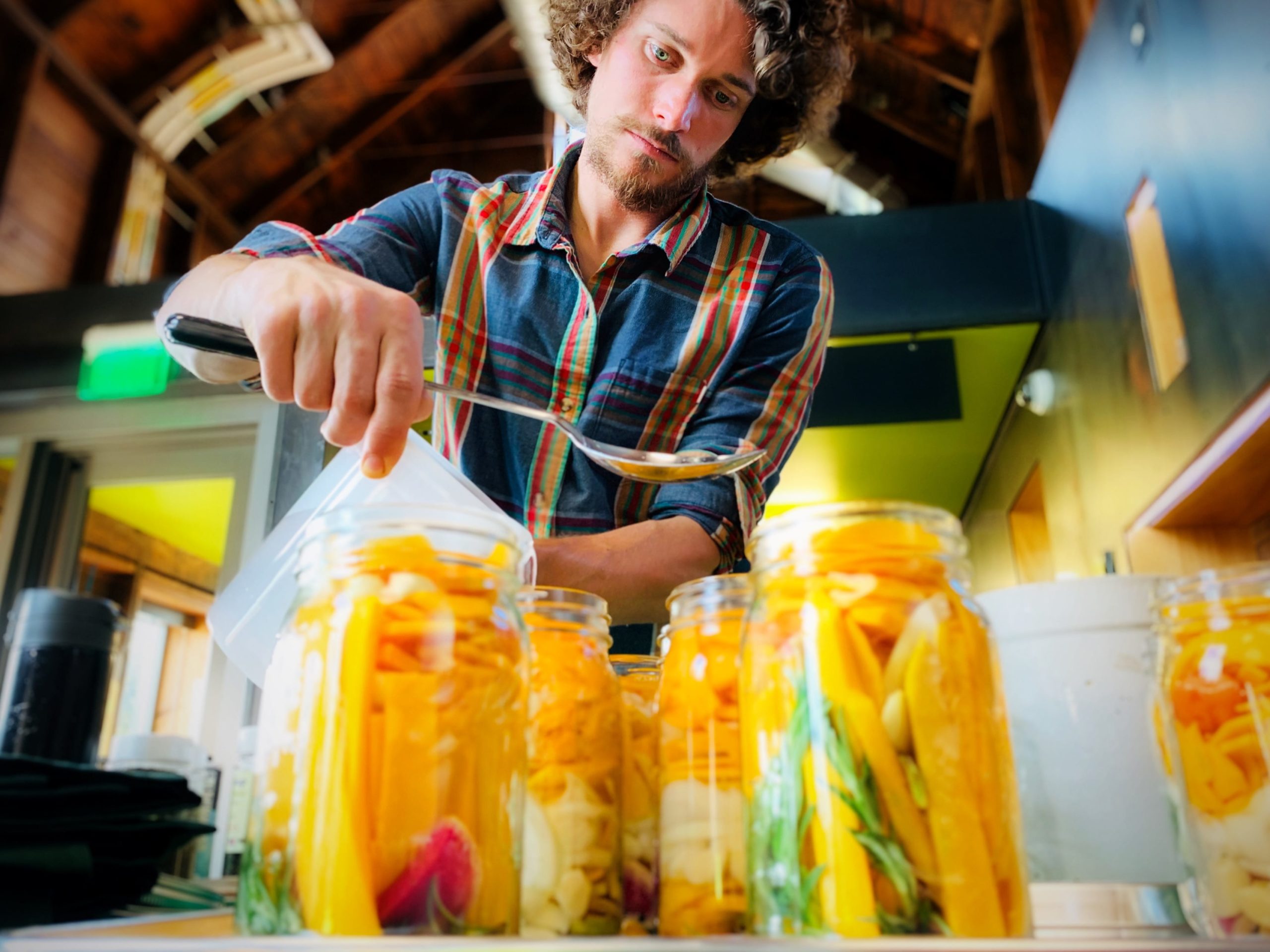This story is part of our Back to School series. To see more stories like this, check out our Home Ec curriculum.
Local fermentation expert Trevor Ring is the founder of Community Cultures, a fermentation education business that “explores health, creativity, and our relationship with food.” Community Cultures is designed with the goal “to make fermentation education accessible for all by emphasizing simple, affordable practices and techniques that don’t require special equipment.”
Pre-pandemic, Ring taught in-person classes and workshops at Phipps Conservatory. Now, like most folks, he has pivoted to virtual classes — most notably the recently concluded “Ferment for Food Justice” series which donated all class proceeds to Black-led organizations that are fighting for food justice, including the Black Urban Gardeners of Pittsburgh. Each Monday in August, topics ranged from lacto-fermented pickles to water kefir to spicy hot sauce, all with the overall mission: to use fermentation to “help people reclaim the food system, connect to our ancestral roots, and facilitate social change.”
https://www.instagram.com/p/CDsOLtoBDkM/
Growing up, Ring didn’t eat sauerkraut or lacto-fermented pickles; it wasn’t until after high school when he began to study sustainable agriculture at Sterling College in Vermont that he began a conscious, deliberate choice to explore food preservation and subsequently fermentation.
“I consider kombucha my gateway ferment and actually sold dorm-brewed kombucha at the local farmer’s market. It didn’t really sell that well because I made it extremely sour, and people weren’t yet excited by the word fermented,” Ring says. Kombucha eventually led to different types of sauerkraut, salami, and yogurt, all of which helped him “think about food and flavor in a new way.”
When asked about the craziest thing he’s ever fermented, Ring first identifies his passions to ferment what is in season and to preserve what is found in the local landscape. “While living in Massachusetts one winter, I wanted to see what local produce I could find in February to make some wild-fermented country wine. I turned beets, carrots, and sweet potatoes into a wine that was surprisingly very tasty after aging for almost a year. It helped remind me that the process of fermentation can turn ingredients that might seem like a strange combination into a delicious representation of seasonality and creativity.”
While kombucha has become more mainstream since Ring’s college days, he makes a point to highlight how the commodification and the oversimplification of health claims associated with the overly sugared bottle you buy at the gas station can lead to this idea that there’s a magic cure-all. He believes that “everyone reacts to fermented foods differently” and that “diversifying our gut by eating many different types of fermented foods has the potential to help us achieve optimal health.” It is important to note that fermented foods have been around for thousands of years, long before scientific studies existed, and as such Ring suggests folks trust their gut (literally) and listen to their bodies. His personal relationship with the improved health benefits of fermented foods began way back with that dorm-brewed kombucha. “I had frequent stomach aches that were pretty painful. After drinking a shot of very strong, highly acidic, dorm-brewed kombucha, those stomach aches often went away within minutes. Experiencing that quick-acting power of fermented foods in my body really opened my eyes to their potential on overall health.”
What is one thing Ring would tell someone who is intimidated by fermentation? “If you see mold, don’t freak out.” He is quick to acknowledge that even experienced fermenters experience unwanted mold. “When it comes to fermented vegetables, you will experience mold at some point in your journey.”
He suggests starting with some basic ferments with a simple process: sauerkraut, water kefir, kefir, beet kvass, and kombucha. “Like all projects in life, it’s a trial and error process. If something seems off, don’t give up. Do your research, reach out to a mentor, and try to fix any mistakes you may have made in your next batch.”
What’s next for Community Cultures?
After the success of the “Ferment for Food Justice” series, Ring thought about how he could continue to use his workshops and privilege to support others (Ring is currently employed as the cheese buyer for the East End Food Co-op, and as such is not dependent on the workshop income). The result: a two-day virtual fermentation event in October that brings fermenters and food activists together. Content will be streamed and donation-based, and again, all proceeds will go to BIPOC-led food-justice organizations. The event will feature notable fermenters and educators such as Sandor Katz, Kirsten Shockey, and Justin Lubecki, founder of Ferment Pittsburgh, as well as small business owners and home fermenters representing immigrants, Spanish-speakers, and folks within the queer and BIPOC community. “The hope is to decentralize the idea of who “owns” this knowledge. While fermentation is currently trendy in white-dominated spaces, it has deep roots in all communities. [We want] to make fermentation education accessible; and spark a broader discussion about the metaphorical aspects of fermentation among social change, community engagement, and the food system,” Ring explains. For more information, follow Community Cultures on Instagram or check the website for details.
Want a fermented snack?
At Very Local PGH we write a lot about beer, so we asked Trevor Ring to suggest a beer and fermented food pairing. His response:
“My good friend Ollie Pinder, who I met through my food studies graduate program at Chatham University, officially launched Wild Rise Bakery, an incredible gluten-free emporium, at the beginning of the pandemic. His gluten-free sourdough bread surpasses any loaves I’ve eaten over the past 10 years. I would highly recommend topping a toasted slice of his sourdough boule with a soft-ripened cheese from The Farm at Doe Run. Pair that with a nice dry cider from Arsenal Cider House—that should hit the spot!”
📸 Header photo: Deanna Alko







